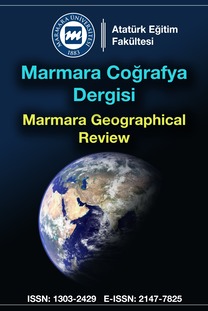Coğrafya Öğretiminde Oluşturmacı Öğretim Yönteminin Öğrencinin Akademik Başarısına Etkisi
Bu çalışmada, oluşturmacı öğretim yönteminin ortaöğretim coğrafya öğretiminde uygulanmasının öğrenci başarısına etkisi araştırılmıştır. Geleneksel öğretim yöntemi ile dünyada gittikçe yaygınlaşan bir öğretim yöntemi olan oluşturmacı öğretim yöntemini karşılaştırmak amaçlanmış, oluşturmacı öğretim yönteminin başarıda daha etkili olduğu savunulmuştur. Bunun için oluşturmacı öğretim yaklaşımının uygulandığı bir deney grubu, bir de geleneksel öğretim yönteminin uygulandığı bir kontrol grubu seçilmiştir. Her iki gruba da aynı konular, aynı zamanda işlenmiştir. Konular işlenmeden önce yapılan açık uçlu soruları ile deney grubu ve kontrol gruplarının hazır bulunuşluk düzeyleri belirlenmiştir.
The Effect Of Achievement Academic Of Constructive Method In Geography Education
In this study, the effect of the implementation of constructive method in high school geography lessons is investigated. The main purpose of the study is to compare the traditional and the constructive teaching methods. Two student groups are picked in order to make the comparison; the experiment and the control groups that for the experiment group the constructive teaching method and control group the traditional teaching method is implemented. The same subjects are taught at the same time for both groups. The readiness levels of the experiment and the control groups are tested with open-ended questions before the subjects are taught.
___
Altunışık, R., - Yıldırım, E., - Coşkun, R., -Bayraktaroğlu, S., (2004) Sosyal Bilimlerde Araştırma Yöntemleri SPSS Uygulamalı Sakarya Kitabevi, Adapazarı.Piburn, M. D.,-Baker, D. R. (1997): Constructing science in middle and secondary school classrooms. Copyright by Allyn and Bacon, USA. . http://www.tojet.net/articles/ 3114.htm’ den 15.02.2006 tarihinde alınmıştır.
Brooks, J. G., ve Brooks. M. G., (1993): In Search of Undestanding: The Case for Constructivist Clasrooms. Alexandria: VA: Association for Supervision and Curriculum Development.
Brooks, G. and M. G. Brooks(1993): The Case for Constructivist Classrooms, ASCD Alexandria, Virginia U.S.A.
Ford, N. and Chen, S. Y. (2000): Individual Differences, Hypermedia Navigation and Learning: An Empirical Study. Journal of Educational Multimedia and Hypermedia. 9(4), 281-312.
Ernest, P. (1995): The one and the many. Constructivism in Education. Erlbaum, Hillsdale, New York. U.S.A.
Gergen, K. J. (1995): Social construction and the educational process. Constructivism in Education. Erlbaum, Hillsdale, New York, U.S.A.
Glassersfeld, E. V. (1995): A Constructivist Approach To Teaching. (Ed. L. P. Steffe ve E. J. Gale). Constructivism in Education. Hillsdale, New Jersey: Lawrence Erlbaum Associates Ins.
Gürol, M. (1995): Bilgi Toplumunun Eğitim Sistemi ve Bu Sisteme Eğiticilerin Yetiştirilmesi. 1. Sistem Mühendisliği ve Savunma Uygulamaları Sempozyumu. (12-13 Ekim 1995), Kara Harp Okulu, Ankara:
İşman, A. (1999): Eğitim Teknolojisinin Kuramsal Boyutu: Yapısalcı Yaklaşımın Eğitim Öğretim Ortamlarına Etkisi. Öğretmen Eğitiminde Çağdaş Yaklaşımlar Sempozyumu. Dokuz Eylül Üniversitesi Buca Eğitim Fakültesi, İzmir.
Lorsbach, A. ve Tobin, K. (1992): “Constructivism as a Referent for Science Teaching”, Research Matters to the Science Teacher, NARST Monograph No. 5-7. http://www.exploratoriumedu/ IFI/resources/ research/constructivism.html-10.05.2005.
Tezci, E. -Gürol, A., (2003): Oluşturmacı Öğretim Tasarımı ve Yaratıcılık, http://www.tojet.net/articles/218.htm.
Senemoğlu, N. (1997): Gelişim, Öğrenme ve Öğretim: Kuramdan Uygulamaya, Ertem Matbaacılık, Ankara.
Von Glaserfeld, E. A., (1995): Constructivist Approach To Teahcing. Hillsdale, New Jersey U.S.A.
- ISSN: 1303-2429
- Yayın Aralığı: Yılda 2 Sayı
- Başlangıç: 1997
- Yayıncı: Marmara Üniversitesi
Sayıdaki Diğer Makaleler
Coğrafya Öğretiminde Oluşturmacı Öğretim Yönteminin Öğrencinin Akademik Başarısına Etkisi
Coğrafya Eğitiminin Etkililiği ve Sorunları
Şanlıurfa'da Sayfiye Yerleşmeleri
Küreselleşen Dünyamızda Coğrafyanın Siyasal Gücü ve Türkiye Ölçeğindeki Rolü
Türkiye'deki Sarımsak Tarımı ve Taşköprü Sarımsağı Üzerine Coğrafi Açıdan Bir İnceleme
